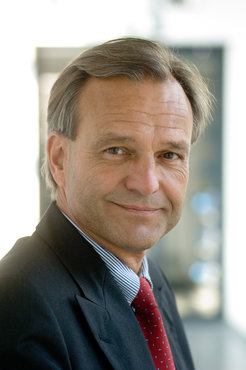Prof. Karsten Danzmann named as Fellow of the American Physical Society
For his leading role at the international level in the area of gravitational wave research, Prof. Dr. Karsten Danzmann Director at the Max Planck Institute for Gravitational Physics and head of the Institute for Gravitational Physics Leibniz Universität Hannover, has been named as a Fellow of the American Physical Society (APS). This distinction has only been bestowed on very few members of the APS.

Upon the recommendation of the “Forum on International Physics”, the American Physical Society recently honoured Professor Dr. Karsten Danzmann with Fellow status. In so doing, the APS has recognized Danzmann’s outstanding contributions to the area of gravitational wave research, especially his “innovative strength and his leading role in all areas of the development of gravitational wave detectors, as well as for his support for collaborative work across national boundaries.”
Prof. Karsten Danzmann: “Being named a Fellow of the APS is a great honour for me. Most importantly, however, it attaches great importance to gravitational wave research as a future-oriented subfield of astronomy and fundamental physics. Thanks to highly advanced technologies, the measuring methods of the terrestrial GEO600 gravitational wave detector (German-British), LIGO (American) and Virgo (Italian-French) are being dramatically refined, so that a direct detection of gravitational waves is fast becoming a reality. An important milestone will be the LISA space mission, which is planned for the next decade.”
Prof. Karsten Danzmann has been working in the area of gravitational wave research since 1990, initially as project head of the “Gravitational Waves” Department at the Max Planck Institute of Quantum Optics in Garching (1990-1993). In 1993 Danzmann accepted an appointment to the Universität Hannover where he headed the Institute for Atomic and Molecular Physics. In addition, from 1994 to 2001 he was the head of the branch of the Max Planck Institute of Quantum Optics. Since 2002 he has been Director at the newly established Max Planck Institute for Gravitational Physics (Albert Einstein Institute) and head of the Institute for Gravitational Physics Leibniz Universität Hannover. Prof. Karsten Danzmann was honoured with the Max Planck Research Award in 1991. He has been a member of the Akademie der Wissenschaften und der Literatur in Mainz.
Professor Danzmann initiated the construction of the German-British GEO600 gravitational wave detector in Ruthe near Hannover and is supervising its further development. The technologies developed specifically for the GEO600 gravitational wave detector are unique throughout the world and are also used in the American LIGO detectors and the Italian-French Virgo detector. The GEO600 project is also a part of an international scientific collaboration together with the LIGO and Virgo gravitational wave detectors. The data of all the detectors is evaluated in Hannover.
Prof. Karsten Danzmann is responsible for the European side of the LISA (Laser Interferometer Space Antenna) space mission, which is being planned by ESA and NASA. The LISA project, which will most like be launched in 2020, is intended to measure space-based gravitational waves at low frequencies (0.1Hz-10kHz), which are inaccessible for earthbound detectors.
The American Physical Society
The American Physical Society was founded in 1899 and is a central location for scientific exchange. Among other things, the society publishes the scientific journal “Physical Review”. In addition to research funding in all areas of physics, the APS sponsors a programme focusing on science education and public outreach.












